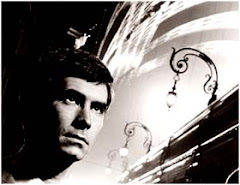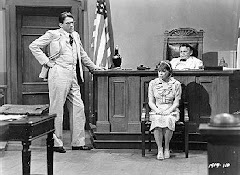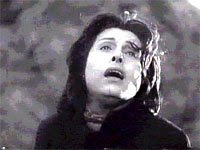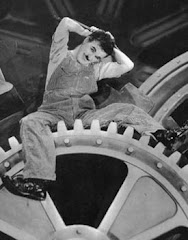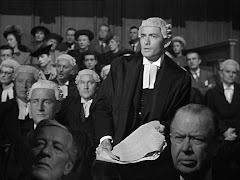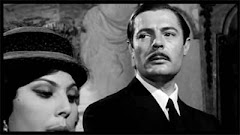Law and the Humanities at Roma Tre
The blog of the "Law and the Humanities" course of lessons at the Roma Tre University (Law Faculty)
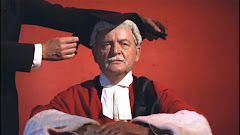
Alfred Hitchock's "Dial M for Murder" (1954)
Sunday 25 May 2008
What do you think of the Law and the Humanities Course of Lessons?
Dear students,
Prof. Conte and I would be really happy to know what do you think about the Law and the Humanities course of lessons that we experimented this year. Which lessons did you enjoy the most? What would you suggest to change? Did anything disappoint you? Someone already told me his/her ideas for a similar course next year but it would be useful to repete them on the blog. You can just leave a comment: feel free to express your opinions.
Thank you for having accepted the challenge of this new course of lessons!
Best
Stefania Gialdroni
Prof. Conte and I would be really happy to know what do you think about the Law and the Humanities course of lessons that we experimented this year. Which lessons did you enjoy the most? What would you suggest to change? Did anything disappoint you? Someone already told me his/her ideas for a similar course next year but it would be useful to repete them on the blog. You can just leave a comment: feel free to express your opinions.
Thank you for having accepted the challenge of this new course of lessons!
Best
Stefania Gialdroni
Thursday 22 May 2008
Last Lecture
Dear students,
Prof. Kiesow's lesson will take place on Wednesday the 28th of May from 12:00 a.m to 13:30 a.m. in the room number 9.
Best
Prof. Kiesow's lesson will take place on Wednesday the 28th of May from 12:00 a.m to 13:30 a.m. in the room number 9.
Best
Prof. Vano's Lectures: Law and Cinema
Dear all,
here some information about Prof. Vano's lessons, readings and C.V.. We are finally arrived at the end of our Law and the Humanities course of lessons, but don't forget the important, conclusive lesson by Prof. Kiesow on May the 28th. Probably the lesson will take place a little bit earlier, at 12:00, but it is very important that you will be there. So...don't forget to have a look at the blog!
Abstract:
Roma tre, May 21-23, 2008
Law & Cinema. Chaplin’s Modern Times: a “deep sense of unlawfullness”
May 21, 2008
Film screening
Modern Times (1936)
Directed by Ch. Chaplin
Short Introduction: The Universe of industrial Labour, Cinema and Legal History
May 22 -23, 2008
Discussion about the movie and selection of the principle themes of legal historical relevance.
From Europe to America and Back to Europe.
Chaplin and the American working class
Observations upon Max Weber’s view of the American labour relations
Readings:
Steven J. Ross, Struggles for the screen: Workers, Radicals, and the political Uses of Silent Film, in The American Historical Review, vol. 96, n. 2 (1991), pp.333-367
Carlo Nitsch, Prospettive dalla riflessione weberiana sulle condizioni di lavoro negli Stati Uniti, in Materiali per una storia della cultura giuridica moderna, 2007 /2, pp.337 ss.
C.V.:
Cristina Vano
Associate Professor, since 2002, of Medieval and Modern Legal History at the Law Faculty of the University of Naples "Federico II". Member of the academic committee of the Research Doctorate in “Roman Law and Roman Law Tradition: the foundations of European law”. Member of the editorial board of the journal “Scienza & politica” (1993-2006) and of "Index. International Survey of Roman Law",(since 2001). She spent long periods of research in Italian and foreign Research Institutes such as: the Istituto storico italo-germanico in Trento (1986), University of Berlin (1987, 1990), University of Trier (1991-1992), the Institut für Römisches und gemeines Recht di Göttingen (1994), the University of California at Berkeley, Robbins Collection, (1996) and above all at the Max Planck Institut für Europäische Rechtsgeschichte in Frankfurt am Main. Member of several international research groups, she taught courses and delivered conferences in many Universities in Italy and abroad (Germany, Switzerland, Spain, Sweden, Portugal). Her research focuses on Savigny and the Historical School with special regard to the construction processes of European nineteenth century legal science and to the communication strategies of scientific knowledge. Her book Il nostro autentico Gaio. Strategie della scuola storica alle origini della romanistica moderna (Napoli 2000) has been recently translated into german (Frankfurt 2008). Moreover she is interested in the history of Italian and European juridical culture of the XIX and XX century, with particular attention for such themes as the use of comparative methods, the professionalization of the jurist, the history of Labour Law.
here some information about Prof. Vano's lessons, readings and C.V.. We are finally arrived at the end of our Law and the Humanities course of lessons, but don't forget the important, conclusive lesson by Prof. Kiesow on May the 28th. Probably the lesson will take place a little bit earlier, at 12:00, but it is very important that you will be there. So...don't forget to have a look at the blog!
Abstract:
Roma tre, May 21-23, 2008
Law & Cinema. Chaplin’s Modern Times: a “deep sense of unlawfullness”
May 21, 2008
Film screening
Modern Times (1936)
Directed by Ch. Chaplin
Short Introduction: The Universe of industrial Labour, Cinema and Legal History
May 22 -23, 2008
Discussion about the movie and selection of the principle themes of legal historical relevance.
From Europe to America and Back to Europe.
Chaplin and the American working class
Observations upon Max Weber’s view of the American labour relations
Readings:
Steven J. Ross, Struggles for the screen: Workers, Radicals, and the political Uses of Silent Film, in The American Historical Review, vol. 96, n. 2 (1991), pp.333-367
Carlo Nitsch, Prospettive dalla riflessione weberiana sulle condizioni di lavoro negli Stati Uniti, in Materiali per una storia della cultura giuridica moderna, 2007 /2, pp.337 ss.
C.V.:
Cristina Vano
Associate Professor, since 2002, of Medieval and Modern Legal History at the Law Faculty of the University of Naples "Federico II". Member of the academic committee of the Research Doctorate in “Roman Law and Roman Law Tradition: the foundations of European law”. Member of the editorial board of the journal “Scienza & politica” (1993-2006) and of "Index. International Survey of Roman Law",(since 2001). She spent long periods of research in Italian and foreign Research Institutes such as: the Istituto storico italo-germanico in Trento (1986), University of Berlin (1987, 1990), University of Trier (1991-1992), the Institut für Römisches und gemeines Recht di Göttingen (1994), the University of California at Berkeley, Robbins Collection, (1996) and above all at the Max Planck Institut für Europäische Rechtsgeschichte in Frankfurt am Main. Member of several international research groups, she taught courses and delivered conferences in many Universities in Italy and abroad (Germany, Switzerland, Spain, Sweden, Portugal). Her research focuses on Savigny and the Historical School with special regard to the construction processes of European nineteenth century legal science and to the communication strategies of scientific knowledge. Her book Il nostro autentico Gaio. Strategie della scuola storica alle origini della romanistica moderna (Napoli 2000) has been recently translated into german (Frankfurt 2008). Moreover she is interested in the history of Italian and European juridical culture of the XIX and XX century, with particular attention for such themes as the use of comparative methods, the professionalization of the jurist, the history of Labour Law.
Thursday 15 May 2008
Prof. Conde's Lectures: Law and Cinema
Dear all,
with a little bit of delay, finally on the blog all the information about Prof. Conde's lectures, readings and c.v.
Abstract:
The lectures will introduce the ‘law and cinema’ contemporary scholarship, trying to look critically (from a european perspective) at some of its premises and results.
Therefore we will focus on underline one of the possible intersections between law and films: that of ‘cinema in law’ (or law on cinema). This approach is by far much less attended (and maybe less ‘funny’, more ‘serious’) than the classical ‘law in cinema’ studies or the (amusing and even ‘worrying’) ‘law as cinema/cinema as law’ debates.
More specifically we will tackle some US Supreme Court decisions (and indecisions) to concisely describe the way in which censorship on films has been –constitutionally and legally- formulated in the twentieth century.
The account should serve as an example –and encouragement- for those students interested in the development of similar subjects, which are not necessarily involved with totalitarian regimes or tendencies.And above all, it is a proposal –and a provocation- concerning the unavoidable (self)analysis about the (individual, social, juridical, economical) limits and burdens of freedom of speech.
Readings:
A) The Yale Law Journal, Vol. 98, No.8, “Popular Legal Culture” (June 1989) (“Introduction”, pp. 1545-1558; Lawrence M. Friedman, “Law, Lawyers, and Popular Culture”, pp. 1579-1606)
C.V.
with a little bit of delay, finally on the blog all the information about Prof. Conde's lectures, readings and c.v.
Abstract:
The lectures will introduce the ‘law and cinema’ contemporary scholarship, trying to look critically (from a european perspective) at some of its premises and results.
Therefore we will focus on underline one of the possible intersections between law and films: that of ‘cinema in law’ (or law on cinema). This approach is by far much less attended (and maybe less ‘funny’, more ‘serious’) than the classical ‘law in cinema’ studies or the (amusing and even ‘worrying’) ‘law as cinema/cinema as law’ debates.
More specifically we will tackle some US Supreme Court decisions (and indecisions) to concisely describe the way in which censorship on films has been –constitutionally and legally- formulated in the twentieth century.
The account should serve as an example –and encouragement- for those students interested in the development of similar subjects, which are not necessarily involved with totalitarian regimes or tendencies.And above all, it is a proposal –and a provocation- concerning the unavoidable (self)analysis about the (individual, social, juridical, economical) limits and burdens of freedom of speech.
Readings:
A) The Yale Law Journal, Vol. 98, No.8, “Popular Legal Culture” (June 1989) (“Introduction”, pp. 1545-1558; Lawrence M. Friedman, “Law, Lawyers, and Popular Culture”, pp. 1579-1606)
Stefan Machura/Peter Robson (eds.), Journal of Law and Society, Vol. 28, No. 1, “Law and Film” (March 2001). The “Introduction”, pp.1-8, includes a selected bibliography (1986-1999)
B) “Motion Pictures and the First Amendment”, The Yale Law Journal, Vol. 60, No. 4. (April 1951), pp. 696-719.
C.V.
Esteban Conde (Barcelona, 1971), Legal Historian (Universities of Barcelona –Autónoma- and now Huelva), received his Ph.D. in Law in 2003. He has written two books (1998, 2006) about the main (and constructive) role played by ‘enlightened’ censorship in Spain, and several articles on police power (its metaphores, tradition and development at the end of the Ancien Régime).
Over the past five years, he has used some interdisciplinary approaches as a tool to teach legal history: litterature and law, and more recently cinema and law.Pictures Law and Music
Monday 5 May 2008
Law and Music on May the 8th
Dear all,
Prof. Resta's lesson will take place in the Hall number 4 at 9:30 (instead of the usual 10:00 o'clock).
Best
Prof. Resta's lesson will take place in the Hall number 4 at 9:30 (instead of the usual 10:00 o'clock).
Best
Sunday 4 May 2008
Next Week: Ascheri, Resta & Polimanti, Zeno-Zencovich
Dear all,
next week will be a week full of events as Prof. Mario Ascheri will talk about Law and Figurative Art (precisely on the Buongoverno frescoes in Siena), Prof. Giorgio Resta, with the help of M° Enrico Maria Polimanti (who will play the piano), about Law and Music and Prof. Vincenzo Zeno-Zencovich about Law and Cinema. Here some information about each class:
7th May 2008: Prof. Ascheri, Law and Figurative Art
Abstract
The lectures will stress the unique institutional situation of Sienese context of early XIV century and therefore the meaning of 'Buongoverno' frescoes, with particular attention to the theme of the Justice.
Bibliography
W. Bowsky, A Medieval Italian Commune, Siena under the Nine 1287-1355, Berkeley 1981
R. Starn, The Palazzo Pubblico, Siena, New York 1994, or his The republican regime of the Sala dei Nove in Siena, in his: Arts of power, Berkeley 1992, pp. 11-80
Q. Skinner, Ambrogio Lorenzetti's Buongoverno frescoes: two old questions, two new answers, in "Journal of the Warburg and Courtauld Institute", LXII (1999), pp. 1-28.
C.V.
Legal historian (Universities of Sassari, Siena and now Rome 3, 2001-), advisor of Max-Panck-Institut in Frankfurt and Senior fellow of Robbins collection (Berkeley, Law School) has written on courts and institutions (Bologna 1996), medieval institution (Bologna 1999), laws of Italian Middle Ages (Rome 2000) and city-states (Bologna 2006).
8th May 2008: Prof. Resta (University of Bari) and M° Polimanti, Law and Music
Abstract
At a first look, law & music might appear as one of the most recent and less investigated frontiers of the law & literature movement. To some extent this is true. However, the interface between law and music has also been the subject of important studies in ancient times, in the middle age (one of the first examples is the anonymous treatise of the fourteenth century Ars cantus mensurabilis mensurata per modus iuris) and during the twentieth century. Prominent legal scholars have written about musical estethics and musicology (f.i. Salvatore Pugliatti) and at the same time several important composers and musicians have had a legal training (among the others Carl Philipp Emmanuel Bach, Schumann, Stravinsky).
The most important intersection between the two disciplines is represented by the theory of interpretation. Interpreting and performing a score raises a set of questions involves a range of problems not entirely different from interpreting a constitution, a statute, a regulation, or even a legal precedent. Lawyers have frequently confronted themselves with the theory of musical interpretation, in order to enhance their self-comprehension of the legal techniques of interpretation. Not by chance, we can find the same debates between originalists, intentionalists and contextualists in law and in music as well.
In my lecture I will try to elaborate more on this subject, with the aid of a professional musician (M° Enrico Maria Polimanti) who will illustrate the most important intellectual trends and the practical problems of interpretation day by day faced by a musical performer. I will also approach the subject from a comparative perspective, looking at the different ways in which civil lawyers (Betti, Pugliatti) and common lawyers (Jerome Frank, Posner) have conceived the interaction between law and music.
Readings:
J. Frank, Words and Music, in 47 Columbia L. Rev. 1259 (1947)
S. Levinson, J.M. Balkin, Law, Music and other Performing Arts, in 139U.Pa. L. Rev. 1597 (1991)
T. Hall, The Score as Contract, in 20 Cardozo L. Rev. 1589 (1999)
J.M. Balkin, S. Levinson, Interpreting Law and Music: Performance Notes on "The Banjo Serenader" and "The Lying Crowd of Jewes", 1999
C.V. Prof. Giorgo Resta:
Giorgio Resta is an Associate Professor of Comparative Law at the University of Bari, Italy, where he teaches courses on private comparative law, contracts and intellectual property. He is author of three books and numerous articles on privacy, fundamental rights, contracts and torts in comparative perspective. He edited the Italian translation of Hesselink’s “New European Legal Culture”. His book “Autonomia privata e diritti della personalità” has been selected as one of the best legal books of year 2005 by the Italian “Club dei giuristi”. He is currently serving as member of the scientific board of the Legislative Committee for the reform of third book of Italian Civil Code, appointed by the Italian Ministry of Justice. He is member of the Italian Association of Comparative Law and editor of “Il diritto dell’informazione e dell’informatica” and “Rivista critica del diritto privato”. He received several scholarships from the Canadian Government (Faculty Research Program), the Max-Planck-Institut für Internationales und Ausländisches Privatrecht (Hamburg, Germany), the Max-Planck-Institut für ausländisches und internationales Patent-, Urheber- und Wettbewerbsrecht (Munich, Germany) and the Italian Research Council. He has been visiting scholar in the Yale Law School, the McGill Law School, the Law School of the University of Toronto, the Duke Law School, the Ludwig-Maximilians Universität (Munich, Germany), the Max-Planck-Institut für Internationales und Ausländisches Privatrecht (Hamburg, Germany). In 1995 he graduated with magna cum laude from the University of Rome “La Sapienza”. In 1999 he received his PHD in Private Law from the University of Pisa. He is member of the Italian bar. His principal academic interests are privacy, information property, media-law, contract and legal history.
C.V. M° Enrico Maria Polimanti, pianist:
Enrico Maria Polimanti studied piano and chamber music at the Conservatorio di Santa Cecilia. Awarded of the prestigious Foundation Scholarship of the Royal College of Music, he moved to London where he studied with Yonty Solomon. Once back in Italy he attended courses at Accademia Chigiana di Siena, at the Scuola Superiore Internazionale del Trio di Trieste. He also took part in numerous international master classes given by Dietrich Fischer-Dieskau, András Schiff.
He won several prizes in Italy, among them: Hyperion chamber music competition 2001(first prize), Euterpe 2003 (first prize, also special prize “Duo Binetti”), “Pietro Argento” 2003 (first prize, also “Prize of the Critics”), Seghizzi International Song Competition 2004 (“Prize for best pianist”).
He plays as soloist and in chamber ensembles for numerous Festivals and concert seasons in Italy and abroad, recently: Orchestre International de la Citè Universitaire in Paris, Primavera in musica agli Uffizi and Radio Vaticana. He regularly gives lessons, lectures and lecture-recitals in several schools and associations of Rome, at Università Roma3, St. Petersburg College-Florida and Federazione Italiana di Musicoterapia.
He translated Charles Rosen’s book “Beethoven’s Piano Sonatas” (Astrolabio-Ubaldini, Roma) and recently he has written the essay The Earth has many keys. Emily Dickinson in the italian contemporary music (Mazzanti, Venezia).
He took part in several radio, television and cd recordings. (lately Rossini’s Petite Messe Solennelle for the label “Tactus”).
His solo and chamber music repertoire covers a wide range of works dating from early eighteen century to the contemporary epoch.
9th May 2008: Prof Zeno-Zencovich, Law and Cinema
Readings:
M. Asimow, Embodiment of Evil: Law Firms in the Movies, in 48 Ucla L. Rev. 2000-2001, pp. 1340-1392
D.R Papke, Conventional Wisdom: The Courtroom Trial in American Popular Culture, in 82 Marq L. Rev. 1998-1999, pp. 471-489
next week will be a week full of events as Prof. Mario Ascheri will talk about Law and Figurative Art (precisely on the Buongoverno frescoes in Siena), Prof. Giorgio Resta, with the help of M° Enrico Maria Polimanti (who will play the piano), about Law and Music and Prof. Vincenzo Zeno-Zencovich about Law and Cinema. Here some information about each class:
7th May 2008: Prof. Ascheri, Law and Figurative Art
Abstract
The lectures will stress the unique institutional situation of Sienese context of early XIV century and therefore the meaning of 'Buongoverno' frescoes, with particular attention to the theme of the Justice.
Bibliography
W. Bowsky, A Medieval Italian Commune, Siena under the Nine 1287-1355, Berkeley 1981
R. Starn, The Palazzo Pubblico, Siena, New York 1994, or his The republican regime of the Sala dei Nove in Siena, in his: Arts of power, Berkeley 1992, pp. 11-80
Q. Skinner, Ambrogio Lorenzetti's Buongoverno frescoes: two old questions, two new answers, in "Journal of the Warburg and Courtauld Institute", LXII (1999), pp. 1-28.
C.V.
Legal historian (Universities of Sassari, Siena and now Rome 3, 2001-), advisor of Max-Panck-Institut in Frankfurt and Senior fellow of Robbins collection (Berkeley, Law School) has written on courts and institutions (Bologna 1996), medieval institution (Bologna 1999), laws of Italian Middle Ages (Rome 2000) and city-states (Bologna 2006).
8th May 2008: Prof. Resta (University of Bari) and M° Polimanti, Law and Music
Abstract
At a first look, law & music might appear as one of the most recent and less investigated frontiers of the law & literature movement. To some extent this is true. However, the interface between law and music has also been the subject of important studies in ancient times, in the middle age (one of the first examples is the anonymous treatise of the fourteenth century Ars cantus mensurabilis mensurata per modus iuris) and during the twentieth century. Prominent legal scholars have written about musical estethics and musicology (f.i. Salvatore Pugliatti) and at the same time several important composers and musicians have had a legal training (among the others Carl Philipp Emmanuel Bach, Schumann, Stravinsky).
The most important intersection between the two disciplines is represented by the theory of interpretation. Interpreting and performing a score raises a set of questions involves a range of problems not entirely different from interpreting a constitution, a statute, a regulation, or even a legal precedent. Lawyers have frequently confronted themselves with the theory of musical interpretation, in order to enhance their self-comprehension of the legal techniques of interpretation. Not by chance, we can find the same debates between originalists, intentionalists and contextualists in law and in music as well.
In my lecture I will try to elaborate more on this subject, with the aid of a professional musician (M° Enrico Maria Polimanti) who will illustrate the most important intellectual trends and the practical problems of interpretation day by day faced by a musical performer. I will also approach the subject from a comparative perspective, looking at the different ways in which civil lawyers (Betti, Pugliatti) and common lawyers (Jerome Frank, Posner) have conceived the interaction between law and music.
Readings:
J. Frank, Words and Music, in 47 Columbia L. Rev. 1259 (1947)
S. Levinson, J.M. Balkin, Law, Music and other Performing Arts, in 139U.Pa. L. Rev. 1597 (1991)
T. Hall, The Score as Contract, in 20 Cardozo L. Rev. 1589 (1999)
J.M. Balkin, S. Levinson, Interpreting Law and Music: Performance Notes on "The Banjo Serenader" and "The Lying Crowd of Jewes", 1999
C.V. Prof. Giorgo Resta:
Giorgio Resta is an Associate Professor of Comparative Law at the University of Bari, Italy, where he teaches courses on private comparative law, contracts and intellectual property. He is author of three books and numerous articles on privacy, fundamental rights, contracts and torts in comparative perspective. He edited the Italian translation of Hesselink’s “New European Legal Culture”. His book “Autonomia privata e diritti della personalità” has been selected as one of the best legal books of year 2005 by the Italian “Club dei giuristi”. He is currently serving as member of the scientific board of the Legislative Committee for the reform of third book of Italian Civil Code, appointed by the Italian Ministry of Justice. He is member of the Italian Association of Comparative Law and editor of “Il diritto dell’informazione e dell’informatica” and “Rivista critica del diritto privato”. He received several scholarships from the Canadian Government (Faculty Research Program), the Max-Planck-Institut für Internationales und Ausländisches Privatrecht (Hamburg, Germany), the Max-Planck-Institut für ausländisches und internationales Patent-, Urheber- und Wettbewerbsrecht (Munich, Germany) and the Italian Research Council. He has been visiting scholar in the Yale Law School, the McGill Law School, the Law School of the University of Toronto, the Duke Law School, the Ludwig-Maximilians Universität (Munich, Germany), the Max-Planck-Institut für Internationales und Ausländisches Privatrecht (Hamburg, Germany). In 1995 he graduated with magna cum laude from the University of Rome “La Sapienza”. In 1999 he received his PHD in Private Law from the University of Pisa. He is member of the Italian bar. His principal academic interests are privacy, information property, media-law, contract and legal history.
C.V. M° Enrico Maria Polimanti, pianist:
Enrico Maria Polimanti studied piano and chamber music at the Conservatorio di Santa Cecilia. Awarded of the prestigious Foundation Scholarship of the Royal College of Music, he moved to London where he studied with Yonty Solomon. Once back in Italy he attended courses at Accademia Chigiana di Siena, at the Scuola Superiore Internazionale del Trio di Trieste. He also took part in numerous international master classes given by Dietrich Fischer-Dieskau, András Schiff.
He won several prizes in Italy, among them: Hyperion chamber music competition 2001(first prize), Euterpe 2003 (first prize, also special prize “Duo Binetti”), “Pietro Argento” 2003 (first prize, also “Prize of the Critics”), Seghizzi International Song Competition 2004 (“Prize for best pianist”).
He plays as soloist and in chamber ensembles for numerous Festivals and concert seasons in Italy and abroad, recently: Orchestre International de la Citè Universitaire in Paris, Primavera in musica agli Uffizi and Radio Vaticana. He regularly gives lessons, lectures and lecture-recitals in several schools and associations of Rome, at Università Roma3, St. Petersburg College-Florida and Federazione Italiana di Musicoterapia.
He translated Charles Rosen’s book “Beethoven’s Piano Sonatas” (Astrolabio-Ubaldini, Roma) and recently he has written the essay The Earth has many keys. Emily Dickinson in the italian contemporary music (Mazzanti, Venezia).
He took part in several radio, television and cd recordings. (lately Rossini’s Petite Messe Solennelle for the label “Tactus”).
His solo and chamber music repertoire covers a wide range of works dating from early eighteen century to the contemporary epoch.
9th May 2008: Prof Zeno-Zencovich, Law and Cinema
Readings:
M. Asimow, Embodiment of Evil: Law Firms in the Movies, in 48 Ucla L. Rev. 2000-2001, pp. 1340-1392
D.R Papke, Conventional Wisdom: The Courtroom Trial in American Popular Culture, in 82 Marq L. Rev. 1998-1999, pp. 471-489
Friday 2 May 2008
Exam: Length
Dear students,
Prof. Conte doesn't want to give you precise limits concerning the length of your essay, so...unleash your creativity! The very important thing is that you have to write a real paper, divided into paragraphs and complete with footnotes: bibliographical references are fundamental!
Best
Prof. Conte doesn't want to give you precise limits concerning the length of your essay, so...unleash your creativity! The very important thing is that you have to write a real paper, divided into paragraphs and complete with footnotes: bibliographical references are fundamental!
Best
Thursday 1 May 2008
Exam: Questions
Dear students,
as you already know, you have to write an essay in English to pass the Law and the Humanities exam. We decided to give you the list of questions concerning the lessons that already took place, even if there will be, of course, other lessons and other questions. Anyway, we understand that you have many other exams to prepare and that it is better to begin as soon as possible.
You have to choose one subject and write your essay.
You can also propose a subject, if you think the ones below don't suit you. In this case, you should write me what you would like to do (stefaniagialdroni@libero.it).
Skeel:
1) How far can we apply the Law and Literature method to Italian law?
2) Try to interpret a part of the Italian constitution with the L&L method.
3) Law, culture and society in the US during the 20th century. The birth of the L&L movement.
4) Law and legal enforcement in Italy in the field of immigration law from a Law and Humanities perspective.
Conte:
1) The two models of relationship between law and history from the Middle Ages to the Historical School.
Gialdroni:
1) Legalism and equity: an opposition that is clear in Shakespeare’s Merchant of Venice and Measure for Measure. Can you find other examples of this opposition in Italian case law, and/or in Italian literature, and/or in Italian cinema?
2) Discrimination: in The Merchant of Venice not everyone stands equal before the law (e.g. the Jews are not citizens). Do you know an example of legal discrimination against Jews or other minorities in history? Try to analyse it from a strictly legal point of view.
3) Liberty of contract: Shylock’s contract in The Merchant of Venice is supposed to be against public policy. Which are the limitations of the liberty of contract in Italian contemporary legal system? Why isn’t it possible to ask “a pound of flash” as penalty?
Harreman:
1) Does it make sense, in your personal experience, to read Franz Kafka for a better understanding of law?
2) Read the short apologue on "Our laws" by Kafka and try to write a piece in the same style on "The Laws in Italy".
Guenthner:
1) Adorno, Althusser, Benjamin, Barthes and Deleuze. If you had to enlighten the law about its workings which of the thinkers named above would be your main source? Try to explain why and also comment on the potential risks involved in bringing such ‘outsider’ knowledge to the discipline of law.
2) Try to analyse Prof. Goodrich’s article focusing on its main points. The following questions might help you to structure your analysis. What is Prof. Goodrich’s understanding of Derrida’s early work? How does it differ from previous readings of Derrida in the legal academy? And how can legal theory profit from Derrida’s early work according to Prof. Goodrich’s reading?
Kiesow:
1) “Is law still law when injustice is involved? What may a modern state based on the rule of law do? How much force may it use?”.
Try to reflect on this quotations of Prof. Kiesow Man and Dog. The Modernity of Law: Jurists, Violence, Poetries, and a Photograph, referring also to the films The trial and/or To kill a mockingbird and/or Paths of glory.
as you already know, you have to write an essay in English to pass the Law and the Humanities exam. We decided to give you the list of questions concerning the lessons that already took place, even if there will be, of course, other lessons and other questions. Anyway, we understand that you have many other exams to prepare and that it is better to begin as soon as possible.
You have to choose one subject and write your essay.
You can also propose a subject, if you think the ones below don't suit you. In this case, you should write me what you would like to do (stefaniagialdroni@libero.it).
Skeel:
1) How far can we apply the Law and Literature method to Italian law?
2) Try to interpret a part of the Italian constitution with the L&L method.
3) Law, culture and society in the US during the 20th century. The birth of the L&L movement.
4) Law and legal enforcement in Italy in the field of immigration law from a Law and Humanities perspective.
Conte:
1) The two models of relationship between law and history from the Middle Ages to the Historical School.
Gialdroni:
1) Legalism and equity: an opposition that is clear in Shakespeare’s Merchant of Venice and Measure for Measure. Can you find other examples of this opposition in Italian case law, and/or in Italian literature, and/or in Italian cinema?
2) Discrimination: in The Merchant of Venice not everyone stands equal before the law (e.g. the Jews are not citizens). Do you know an example of legal discrimination against Jews or other minorities in history? Try to analyse it from a strictly legal point of view.
3) Liberty of contract: Shylock’s contract in The Merchant of Venice is supposed to be against public policy. Which are the limitations of the liberty of contract in Italian contemporary legal system? Why isn’t it possible to ask “a pound of flash” as penalty?
Harreman:
1) Does it make sense, in your personal experience, to read Franz Kafka for a better understanding of law?
2) Read the short apologue on "Our laws" by Kafka and try to write a piece in the same style on "The Laws in Italy".
Guenthner:
1) Adorno, Althusser, Benjamin, Barthes and Deleuze. If you had to enlighten the law about its workings which of the thinkers named above would be your main source? Try to explain why and also comment on the potential risks involved in bringing such ‘outsider’ knowledge to the discipline of law.
2) Try to analyse Prof. Goodrich’s article focusing on its main points. The following questions might help you to structure your analysis. What is Prof. Goodrich’s understanding of Derrida’s early work? How does it differ from previous readings of Derrida in the legal academy? And how can legal theory profit from Derrida’s early work according to Prof. Goodrich’s reading?
Kiesow:
1) “Is law still law when injustice is involved? What may a modern state based on the rule of law do? How much force may it use?”.
Try to reflect on this quotations of Prof. Kiesow Man and Dog. The Modernity of Law: Jurists, Violence, Poetries, and a Photograph, referring also to the films The trial and/or To kill a mockingbird and/or Paths of glory.
Subscribe to:
Posts (Atom)





